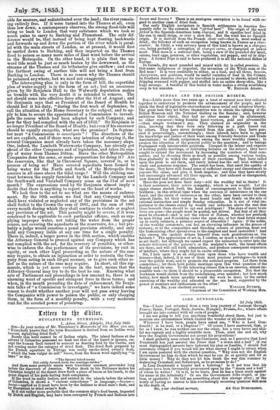Itttru In tlir Cahn.
BUCCANEERING ETYMOLOGY.
1, Adam Street, Adelphi, 21st July 1855. Sra—In your notice of Mr. Thornbury's Monarchs of the Main you say., "Everybody knows that the term Buccaneer is derived from an Indian word boucan, signifying dried flesh." Surely this word cannot be of Indian origin. The island Indians at the advent of Columbus possessed no flesh but that of the lizard or iguano ex- cept the human flesh turned to account as feasting food by the Caribs, and not coming under the category of dried flesh. The dried flesh prepared by the French squatters in Tortuga was really smoke-dried swine's flesh, "which the base vulgar do call" bacon, from the Saxon word signifying "to bake" or dry.
"The funeral baked meats
Did coldly furnish forth the marriage-tables.' And these same portable meats were travellers' common provender long before the discovery of America. Walter Scott in his Talisman makes his Christian knight in the desert draw forth a piece of bacon at his lunch, to the great disgust of his pork-hating Arab companion. If the word be really Indian, and existed in the islands before the advent of Columbus, it shows a " curious coincidence " in language,—boucan-- bacon—applied as it must have been by the Indians to dried man's flesh, and by Europeans to dried swine's flesh.
Is it not rather more probable that the common ship's food bacon, imported by Dutch and English, may have been corrupted by French and Indians into
bucan and boucan ? There is an analogous corruption to be found with re- gard to another class of dried flesh. Our early English navigators to Spanish settlements in America fre- quently refer to the common food "jerked beef." The origin of the word jerked is the Spanish-American term charqui, and it signifies beef dried in the sun in small strips, or over a slow fire. But the word has no Spanish origin. It is derived from the French chair cuit—that is, meat cooked or dried ; the follower of such an occupation being known in France as a char- coutier. In Chile, a very savoury mess of this kind is known as a charqui- can, being probably a corruption of charqui come, or charquied or jerked meat. This mesa is a national dish, being a stew of the pounded dry meat, onions, hard eggs, potatoes, or other vegetables, red pepper, and oil or drip- ping. A former Pope le said to have preferred it to all the national dishes of Europe. In Canada, dry meat pounded and mixed with fat is called pemecan. Is this name indigenous or imported, the invention of the White man or the Bed man ? It is very creditable to either, as a food, and all three, boucan, charquican, and pesnican, would be useful varieties of food in the Crimea. In Southern America charqui for travellers is pounded to shreds, mixed with dripping seasoned with pepper, and stuffed into an entire sheep-skin, like a huge sausage. A handful of this boiled in water makes a strong nourishing soup in ten minutes. W. BB1DGES ALIASES.


























 Previous page
Previous page